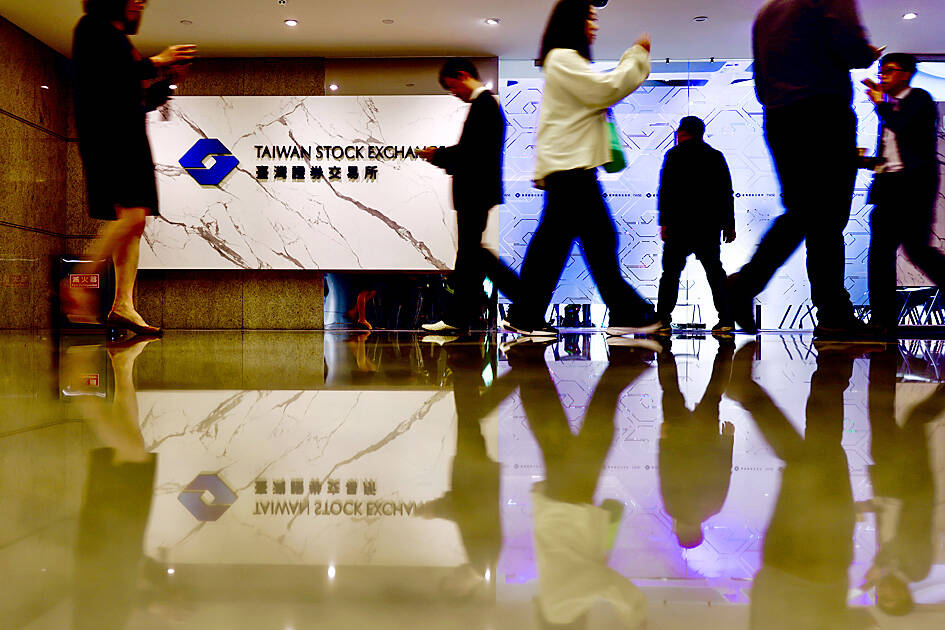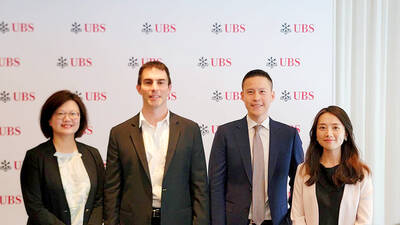Real estate agent and property developer JSL Construction & Development Co (愛山林) led the average compensation rankings among companies listed on the Taiwan Stock Exchange (TWSE) last year, while contract chipmaker Taiwan Semiconductor Manufacturing Co (TSMC, 台積電) finished 14th.
JSL Construction paid its employees total average compensation of NT$4.78 million (US$159,701), down 13.5 percent from a year earlier, but still ahead of the most profitable listed tech giants, including TSMC, TWSE data showed.
Last year, the average compensation (which includes salary, overtime, bonuses and allowances) paid by TSMC rose 21.6 percent to reach about NT$3.33 million, lifting its ranking by 10 notches from a year earlier to the 14th-highest among listed companies.

Photo: Ritchie B. Tongo, EPA-EFE
Communication network IC designer Realtek Semiconductor Corp (瑞昱) was second with average compensation of NT$4.75 million, ahead of smartphone IC designer MediaTek Inc (聯發科) with NT$4.63 million, IC packaging and testing services provider ASE Technology Holding Co (日月光) with NT$4.49 million and conglomerate Namchow Holdings Co (南僑) with NT$4.12 million.
High-speed interface transmission chip designer Asmedia Technology Inc (祥碩) was sixth with NT$4.098 million in total compensation, followed by investment firm GTM Holdings Corp (勤益) with NT$4 million and printed circuit board maker Global Brands Manufacture Ltd (精成) with NT$3.79 million.
TSMC’s application-specific integrated circuit design unit Global Unichip Corp (創意) followed with NT$3.63 million, ahead of MediaTek’s wireless communications chip design unit Airoha Technology Corp (達發) with NT$3.59 million.
On the over-the-counter (OTC) market, cloud solution provider Aspeed Technology Inc (信驊) took the top spot, paying its employees almost NT$5.46 million in average compensation last year, ahead of game developer International Games System Co (鈊象) with NT$4 million, according to the Taipei Exchange, which runs the OTC market.

TECH TITAN: Pandemic-era demand for semiconductors turbocharged the nation’s GDP per capita to surpass South Korea’s, but it still remains half that of Singapore Taiwan is set to surpass South Korea this year in terms of wealth for the first time in more than two decades, marking a shift in Asia’s economic ranks made possible by the ascent of Taiwan Semiconductor Manufacturing Co (TSMC, 台積電). According to the latest forecasts released on Thursday by the central bank, Taiwan’s GDP is expected to expand 4.55 percent this year, a further upward revision from the 4.45 percent estimate made by the statistics bureau last month. The growth trajectory puts Taiwan on track to exceed South Korea’s GDP per capita — a key measure of living standards — a

Samsung Electronics Co shares jumped 4.47 percent yesterday after reports it has won approval from Nvidia Corp for the use of advanced high-bandwidth memory (HBM) chips, which marks a breakthrough for the South Korean technology leader. The stock closed at 83,500 won in Seoul, the highest since July 31 last year. Yesterday’s gain comes after local media, including the Korea Economic Daily, reported that Samsung’s 12-layer HBM3E product recently passed Nvidia’s qualification tests. That clears the components for use in the artificial intelligence (AI) accelerators essential to the training of AI models from ChatGPT to DeepSeek (深度求索), and finally allows Samsung

READY TO HELP: Should TSMC require assistance, the government would fully cooperate in helping to speed up the establishment of the Chiayi plant, an official said Taiwan Semiconductor Manufacturing Co (TSMC, 台積電) yesterday said its investment plans in Taiwan are “unchanged” amid speculation that the chipmaker might have suspended construction work on its second chip packaging plant in Chiayi County and plans to move equipment arranged for the plant to the US. The Chinese-language Economic Daily News reported earlier yesterday that TSMC had halted the construction of the chip packaging plant, which was scheduled to be completed next year and begin mass production in 2028. TSMC did not directly address whether construction of the plant had halted, but said its investment plans in Taiwan remain “unchanged.” The chipmaker started

LOOKING BRIGHT: Taiwanese tech stocks have been trading at 18 to 19 times earnings, beating the 15 percent long-term average amid AI-driven optimism, an analyst said Taiwan’s economy could expand by as much as 5 percent this year, fueled by its technology manufacturing edge amid a global artificial intelligence (AI) boom, while tariff exemptions on semiconductor products keep the country’s levy burden low despite a headline rate of 20 percent, UBS Investment Bank said yesterday. “Although Washington has imposed a 20 percent tariff on goods from Taiwan, exemptions for semiconductors keep the weighted average low,” UBS senior economist for Asia and China William Deng (鄧維慎) said. The growth momentum is expected to extend into next year, with technology companies’ revenue projected to rise 17 percent, UBS research head